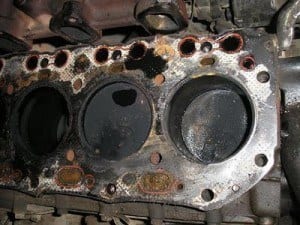 Head gaskets are a vital part of the engine that, if going bad, will keep you going in and out of auto repair shops. That’s because a bad head gasket is usually indicative of other engine problems and can even cause further damage. Head gaskets are the caps that seal and secure the heads of the cylinder, ensuring constant pressure and guarding against leakage.
Head gaskets are a vital part of the engine that, if going bad, will keep you going in and out of auto repair shops. That’s because a bad head gasket is usually indicative of other engine problems and can even cause further damage. Head gaskets are the caps that seal and secure the heads of the cylinder, ensuring constant pressure and guarding against leakage.
Head gaskets can often wear through to the neighboring cylinders at the point where they touch, which also happens to be generally the weakest point. When the casing around the cylinder is broken, pressure can leak through, and engine compression drops dramatically. Because an engine is a closed pressure system, any unwanted change in compression affects power noticeably. If a drop in compression sounds like something you’re experiencing, have the car looked at. Mechanics in repair shops can quickly identify the problem.
Engine overheating is both a cause and an effect of failing head gaskets. When a head gasket starts to leak coolant, friction is increased around the cylinder as it moves, and heat is created. As the cylinder heats up, it and its surroundings can become warped, and neighboring head gaskets may begin failing. One bad head gasket, if not taken care of accordingly, can wreak havoc in an engine and necessitate several trips to repair shops.
Mechanics in auto repair shops must remove the cylinder from an engine in order to fix the matching head gasket. The repair may be very labor intensive. It’s important to take care of a failing head gasket quickly, and when you do, make sure the mechanics are certain the other cylinders and head gaskets are in good working order.



